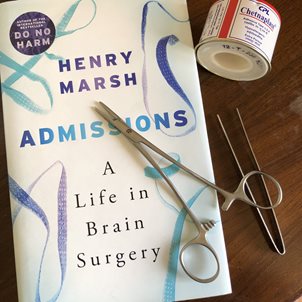I enjoyed Henry Marsh's first book,
'Do No Harm' and so, especially as several chapters are devoted to Marsh's work in Nepal – a country I know well – I was keen to read this book, but I'm sorry to say that this memoir is terribly flawed. It felt like quite a confessional but more importantly, Marsh didn't seem to have enough material to write about his work and filled out the pages with repeated references to his failed marriage, his prostatism, to rebuilding houses and planting trees, so I ended up skipping great chunks of Grand Designs type descriptions. I also thought it a bit sad that there were many more references to the wife he was unfaithful to and divorced him than the wife who he subsequently married and – I assume – is still with him.
The chapters on Nepal were interesting but I was puzzled that he thought that none of the doctors he met could speak English. Medical education in Nepal (and India, where some Nepali doctors train) goes on in English so I wonder whether he was confusing reticence and shyness or difficulties with his accent for lack of comprehension. He should have been able to converse with his Nepali colleagues if he'd been a little patient and open-minded. Perhaps his personality was a bit overpowering?
His competitiveness comes across strongly and I smiled as I read of his short (300m) ascent of Poon Hill. Walking as altitude is all about not showing off, but of setting a pace you can keep up all day. He – in trying to demonstrate he wasn’t an old man – became terribly breathless and had to stop often.
Marsh clearly isn't learning to grow old gracefully, nor is he coming to terms with retirement at all well, he also admits to being scared of dying and dementia and believes that there are only two ways to die: miserably or assisted suicide. Euthanasia illegal in the UK but like many hospital doctors he is completely unaware of the important roles played by GPs and community nurses so that death is inevitably horrendous. He is oddly unaware that good deaths are not only possible but often happen in the UK. People who choose to die at home are ably supported, given soothing and pain-killing medicines and have a peaceful passing. It is a great pity that this doctor who has so much experience of suffering wasn’t able to share more positivity and help others through challenging times, as so many medics do. Definitely steer clear of this book if you yourself are feeling a bit low, or find retirement or aging or illness scary, as this will just make you want to put a bullet in your head!
